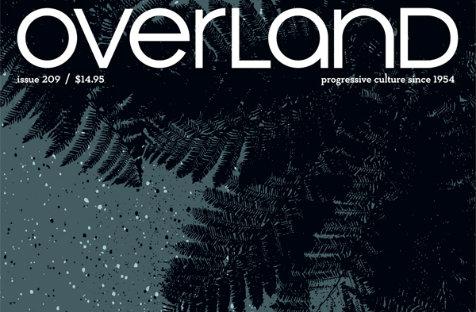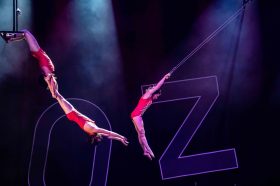‘Overland is fundamentally committed to emerging writers,’ Jeff Sparrow begins his editor’s note to the Summer 2012 edition. Reinforcing this aspect of the journal’s ethos is apt given this edition’s feature: the winning entries of the Overland Victoria University Short Story Prize. Accompanied by many essays examining the role and place of a writer within the contemporary political and commercial landscape, an organic theme begins to emerge. Add the plethora of pieces which tackle political and cultural discourses, and this Summer edition makes manifest great writing’s ability to enthral, provoke, encourage inquiry; it also asserts why, no matter what the climate, such writing is ultimately necessary.
One of the highlights in the first few pages is Everett True’s ‘Me and Pussy Riot’, which reflects on the grand scale dissenting action of Pussy Riot’s performance in a Russian Orthodox Cathedral in Red Square. True’s well-rounded article delves into the global media frenzy begat by the event, teasing out the hypocrisies of the West’s reaction and pointing out the significance of the very public space chosen to host their revolutionary act. Drawing from a wealth of sources, True contextualises the performance’s power, his own voice as bold and vigorous as his subject.
Two features cast an investigative eye on aspects of law and enforcement. Lawyer Elizabeth O’Shea’s ‘You Can’t Dream’ delves into the incomprehensible purgatory faced by asylum seekers in indefinite detention. Unravelling the legal tape that binds them, what particularly confronts is O’Shea’s spelling out of the relative immunity from review that unelected executive decision-makers are granted. The stifling reality of the detained is conveyed with accounts of legal proceedings juxtaposed with internees’ conversations at Villawood, allowing the voice of vulnerability to speak for itself.
In ‘Descended Upon by Looters’, Sophie Cunningham examines the days following the devastation wreaked by Cyclone Tracy in 1974, during which looting, the police, and policing blurred. Having fossicked historical details from archival sources we are presented with an honest and multifaceted account of the ‘crimes’ committed and the tensions which brewed, especially those surrounding the discord created by differing cultural responses in the disaster’s wake.
Fiona Capp’s ‘Salinger’s Toilet’ brings to focus the fascination with confessional culture and its historical origins. The anecdotal example of the sale, on eBay, of JD Salinger’s ‘pristine’ toilet – the enticing ‘place where the writer metaphorically as well as literally spilled his guts’ as the advertisement rhetoric suggests – is a suitably employed launching pad for this survey. Capp casts an eye over lamentable instances where the excesses of the confessional phenomenon have caused unease, including Zadie Smith’s view on social networking’s reductionist properties. Lisa Farrance’s ‘Living the Life Within’ provides insight into a different kind of cultural expression, with an absorbing argument as to how sports can ignite camaraderie and help us reclaim our bodies from the capitalist machine. Farrance also elucidates some interesting potential for sporting culture to spill into our everyday lives with negative discursive repercussions.
‘Scenes from a Radical Theatre’, David Carlin’s history of Adelaide’s Red Shed Company, and ‘Political Writers in the Neoliberal Age’ by Rjurik Davidson deal with the socio-political environments which house creativity and how they influence or hinder creative motivations. Carlin cleverly uses an act scene structure to frame his account of the company’s visionary beginnings, its egalitarian collective and times of financial uncertainty: the various ebbs and flows within a ‘working place’ creating art that matters. Davidson deftly interrogates the need for revitalising counter-hegemonic discourse. He examines book industry economics and how the dominant ‘polite liberal discourse’, as he puts it, prevents writers engaging with hairier topics, especially if they’re hoping to make an economic living from their words.
‘On Not Having a Career’ by Alison Croggon and ‘Balancing the Books’ by Maria O’Dwyer both look at the non-traditional trajectory of a writing career and its attendant financial realities. Croggon wittily engages us, discussing how irked she is by the proliferation of advice on how to cultivate an author ‘brand’ in light of her own experiences. O’Dwyer investigates the ‘portfolio careers’ – multiple outlets that allow for financial and creative provision – of professional early career writers. Balancing her own research and insights with those of the interviewed writers, a diverse picture of what a writer’s life can entail emerges; common to all is the need to juggle employment, personal priorities, relationships and, of course, writing.
The overall impression given by this issue is that a writer’s journey can be a complicated struggle. And so the inclusion of the finalists of the Overland Victoria University Short Story Prize serves as the pearl of hope for aspiring and emerging writers. Newly incumbent fiction editor, Jennifer Mills, introduces the winning stories with an appraisee of the submissions overall, providing some handy tips for writers-in-the-making. Joint runners-up, John Turner’s ‘Killing Floor’ and Melissa Fagan’s ‘The Day the World Stayed the Same’, as well as winner Tara Cartland’s ‘Frank O’Hara’s Animals’ all display a confident command of language, impressive world building (owing largely to well-realised aesthetic energy) and points of unique intrigue that compel the reader to stay with them beyond the end.
The poetry pages provide many gems including the perturbing gothic ‘Glazed Coyote Crème Brûlée’; ‘Winter War’ with its rich natural imagery alive within an economical use of words and form; and the quiet power of ‘Pillage’, an account of transitioning from a state of innocence to an awareness of hypocrisy.
The thoughtfully curated collection of fiction, poetry and critical dialogue comprising Overland #209 continues the journal’s tradition of providing for writers, emerging and established, an entree to a space where culture matters; and for readers a reliable place to get their mind food fix.
Rating: 4½ stars out of 5
Overland#209
Edited by Jeff Sparrow
Summer 2012
Paperback, 96 pp, RRP $14.95
Published by the OL Society Limited





